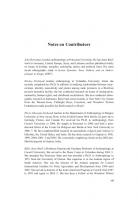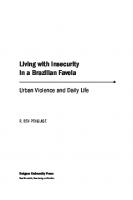Dangerous Encounters: Meanings of Violence in a Brazilian City 9781503621947
139 33 29MB
English Pages 308 [277] Year 2022
Recommend Papers

- Author / Uploaded
- Daniel Touro Linger
File loading please wait...
Citation preview
DANGEIOUJ ENCOUNTEIJ Meanings of Violence in a Brazilian City
PRIFACI
Doing anthropological fieldwork, I, like many others, sometimes experienced a frustrating relativity effect: the closer I moved to a phenomenon, the faster it seemed to recede from my grasp. Every step forward revealed new complexities. This problem seems especially to bedevil the study of culture, something that when seen from a distance can appear monolithic and systematic but when viewed up close, in the ideas and feelings of individuals, seems to fragment into bewildering shards. Believing as I do, however, that an anthropology that loses sight of actual persons is an impoverished anthropology, there is no alternative but to cultivate a double focus, on both society and the person, in an effort to forge a coherent, sensitive statement about the person-in-society, our common, albeit variably experienced, human condition. It is with this double focus that I try in this book to say something about Brazilians-in-llrazil without effacing the complexities of persons or of their collectivity. Because I am an outsider, however, and because any ethnography necessarily represents individuals and societies in summary fashion, the picture I draw is inevitably skewed and oversimplified. I think nevertheless that it portrays significant issues in Brazilian lives. The book discusses two conceptually linked forms of face-to-face encounter in urban Brazil: Carnival, a bacchanalian pre-Lenten tcstival; and bri_f!a, a potentially lethal confrontation in the street. As social experience, the face-to-face encounter is elemental, mobilizing our strongest emotions Vll
vm
Prtfacc
and our strongest controls. Brazilians, like people elsewhere, worry about the perils of coming face-to-face with the wrong person, at the wrong time, under the wrong circumstances. Carnivals and brigas, I argue, highlight such perils, which arc products of culturally specific constructions of interpersonal relationships and the self. These turbulent events dramatize distinctive, profound social and psychological dilemmas. The study is based on my fieldwork in Sao Luis, capital of the state of Maranhao, where I resided with my wife, Lynn Simons, and my son, Eli, from March 1984 to March 19X6. This was an exciting time to be in Brazil, for at the midpoint of my stay the country underwent a transition from a discredited, feared, and widely hated military dictatorship, in power for over two decades, to a civilian government. If the new government came in under a black cloud-the popular president-elect, Tancredo Neves, died before he could take office, replaced by his vice president of convenience, the conservative maranhense Jose Sarney-the public mood during this period was nevertheless, by and large, one of restrained hopefulness. The saoluiscnses I knew were universally pleased that the worst days of repression were past and seemed unlikely, in the short run at least, to recur. Nevertheless, they remained keenly aware that something was deeply wrong in Brazilian society: they had certainly not inherited the power ostensibly relinquished by the military officers. They continued to suffer injuries to their self-respect and, in some cases, to their physical persons long after the generals turned the mess over to civilians. Sao-luisenses, most of whom arc working people who feel vulnerable to the privileged and the powerful, and resent it, celebrated the election of Tancredo Neves with a Carnival of victory in the city's main square, not because they naively expected immediate and revolutionary change, but because they yearned for a sense of dignity so long denied them. If, as I argue, Sao Luis's dangerous encounters originate in the experience of social oppression Brazilian style, sao-luisenses nevertheless do not accept, and have not surrendered to, the conditions that, lamentably, so often inject rancor and violence into their interactions with one another. If anything redeems the dark and troubled scene I describe, and, moreover, holds a promise of someday dispelling (in Chico Buarque's words) the "tenebrous transactions" of Brazilian society, it is this insistence on dignity by men and women who refuse to consent to their own nullification. This book could never have been written without the cooperation of many sao-luisenses who consented to speak of the not-always-pleasant aspects of their lives. To them I wish to express my gratitude openly and clearly. It has become somewhat of a cliche to say that the people we used to
Pr~focc
IX
call "informants" are significant participants in the writing of our ethnographies; in this case, the truth of the observation is, I trust, evident. I hope my use of the words of Tito, Joana, and the others who spoke into my tape recorder, identified herein only by pseudonyms, does not betray the spirit in which they were given. While doing interviews and engaging in that weird activity we call participant observation I often felt as though I were, as Brazilians put it, neither fish nor meat. Here I can mention only a few of those in Sao Luis who made me feel less a stranger by extending their trust and warm acceptance to Lynn, Eli, and me. The Martins family-Dona Augustinha, Seu Ze, Gra









![The Chinatown Trunk Mystery: Murder, Miscegenation, and Other Dangerous Encounters in Turn-of-the-Century New York City [New ed.]
0691130485, 9780691130484](https://ebin.pub/img/200x200/the-chinatown-trunk-mystery-murder-miscegenation-and-other-dangerous-encounters-in-turn-of-the-century-new-york-city-newnbsped-0691130485-9780691130484.jpg)